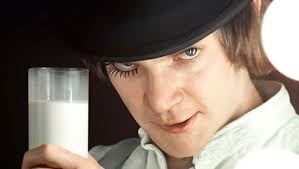OK, after many months, this blog is now back from being a defunct blog to an actual blog again. The subject of this go-round is Stanley Kubrick’s “A Clockwork Orange.” I’m not going to recap the story or setup what happens in the film, as I think that those points are well-known by now.
In high school I borrowed the novel by Anthony Burgess from a classmate. When I returned the book, he naturally asked what I’d thought of it. I remember saying that I found it a little troubling that the main character had not changed at the end. He responded that everything was cool in the film version. “In the last scene, he’s f**ckin’ this girl,” he told me. Apparently, redemption happens through coitus. Years later I learned that the U.S. publisher had excised the novel’s last chapter, in which the narrator Alex indeed changes. I subsequently saw the film at a strip-mall theater that showed mostly offbeat films (John Waters’ “Pink Flamingoes” was representative of the theater’s usual fare.) At the time, I viewed the film mostly in terms of its cinematic technique, which I found breathtaking. Over the years though, I’ve come to have reservations about the film, to the point where I wonder what Kubrick what thinking when he made it.

Got milk?
When asked what drew him to the story, Kubrick responded that the language, the characters, and pretty much everything about the novel intrigued him. The film begins with the famous close-up of a leering Malcolm McDowell with his eyes fixed on the viewer. The camera then dollies back, revealing Alex’s friends and the environs of the Korova milk bar. All the while, a synthesized version of Henry Purcell’s “Music for the Funeral of Queen Mary” plays in the sound track while Alex’s narrates. It’s an effective opening scene and others follow.
OK, so I won’t argue that the picture isn’t masterfully made (the balletic fight with Billy Boy’s gang, the high-speed orgy set to the William Tell Overture, the point-of-view shot as Alex jumps out a window, the film’s use of music, etc.) It’s just that over time, I’ve come to see it as problematic.
Part of my new-found reticence is no doubt a reaction to revelations in the news about powerful men harassing, and even sexually assaulting women who worked under them. Against this backdrop, it’s hard to watch the film without feeling extremely uncomfortable. Adrienne Corri, who plays Mrs. Alexander in the film, appeared in many roles. She is best known however, for the brutal rape scene in “A Clockwork Orange.” When I re-screened the film to write this entry, I found I had to skip this scene.
If you read the book in addition to watching the film, it’s clear that Kubrick added erotic elements that are absent from the novel. In the scene where Alex kills the “Cat Lady”, erotic canvases hang on the walls (and the notorious rocking phallus sculpture is near the door.) Not sure why Kubrick felt he needed to add those, but they’re there. What’s up with that?
And what of that surrealistic scene at the end of “A Clockwork Orange”, the one that my classmate found so redemptive? Well, it turns out he was right – in a way. The film ends with the implication that Alex has become less violent than he was at the beginning of the story, though it is only an implication. The final shot depicts Alex’s reverie of cavorting with a woman. It is the only scene in the film where a sexual encounter seems consensual, not forced. That’s something, I guess.
In the end, I’ve come to think of ACO as a film that is brilliantly made, but with a main character who is so abhorrent that watching the film is a deeply unpleasant experience.
This-is-neither-here-nor-there-deparment – Upon viewing the film again, I noticed that Patrick Magee as the writer delivers a performance that’s way over the top, especially in the later scenes where he takes Alex in, not realizing that Alex is the brutal criminal who visited his home earlier. So over the top is Magee’s performance that I was amazed that I’d failed to appreciate how absolutely unhinged it really is. It kinda works, though.
